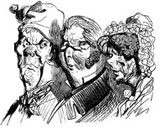
Christian Rebirth in Secularized Italy
LETTER FROM ROME
On September 29th the Pope celebrated, with about 10,000 young people, the 30th anniversary of Communion and Liberation (CL). The ceremony, which took place in the Vatican, was also attended by numerous cardinals, among whom was the prefect of the Congregation for the Doctrine of the Faith, Joseph Cardinal Ratzinger, and many bishops and journalists from all parts of the world. The Italian press and television gave great attention to this event.
But why so much interest, inside and outside ecclesiastical circles, for a movement that is just now expanding abroad and whose numbers do not exceed 100,000? In Italy, other older associations, such as Catholic Action, have, at least on paper, more members. Yet no other Catholic group has generated so much admiration and criticism, love and hatred, such great hope and so many visceral condemnations. At a time when Italian society has become gradually secularized, and even the laicist intelligentsia was thought to have settled accounts with the Catholic Church, Christianity has once again become a disturbing presence with the advent of CL.
Let’s examine how Communion and Liberation got started. In fact, its deeper identity is contained in its origins. Over 30 years ago, in October 1954, a young priest, “Don” Giussani, decided to renounce his academic career (he was teaching moral theology at the main seminary in Milan) to dedicate himself to the apostolate of the social environment. In agreement with his bishop, he became the religion teacher in a local high school in a small town. With the typical passion of whoever has realized existentially that in Christ “Beauty has become meat,” Don Giussani began asking the youth in every Catholic association in the school if they really believed in Christ: the embarrassment and wonder of their faces said more than their words.
In years in which no one really doubted the “Catholicity” of Italy, that young priest nurtured the conviction that the faith could not be taken for granted any more. It was no longer a question of emphasizing particular aspects of Christianity, but rather of starting again from the basics, from the Gospel proclamations. To be born and grow up in a good Catholic family was no longer a guarantee of one’s faith. It was necessary that people, first of all the youth, again encounter Christianity.
You May Also Enjoy
The late-twentieth-century Catholic Church didn't mean ill; she was simply too exhausted to bother her members much.
Journey Through a Disenchanted Land... A Record of What We’ve Lost... More, Please!... On the Vocations of Catholic Universities... and more
Globalization of the economy could be halted or at least significantly modified so that the people of the world, rather than corporate interests, will benefit.

